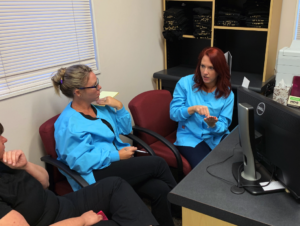TCs: Where Have All the Good Ones Gone?

Doctors have been reaching out, looking for TCs more than ever before. Frankly, there are more ortho offices popping up than there are TCs! So, what is a doc to do when they can’t find an experienced TC anywhere? Where do they look and what do they look for?
DISC is the Key
I caught a clip posted by one of my favorite and widely respected orthodontists, Dr. Neal Kravitz, that pointed fellow docs in the right direction. He told them to look for someone with the SI personality type. For anyone unfamiliar, this is from the DISC (Dominant, Influential, Steady, Calculating) personality assessment test. It’s a fabulous tool, and something we’ve always urged our Straight Wire clients to require from new applicants.
The SI personality type he mentioned is characterized as “The Collaborator” by the assessment test. Someone with this score would likely put focus on others before themselves. They’d clearly be recognized as a “people-person” due to their natural level of empathy. This ability enables SIs to form new friendships easily, and let’s remember that we need our TC to make friends with our New Patient quickly and effortlessly work through a financial arrangement without passing judgements.
Makes sense why this personality type would be an ideal fit for the office role, right? Personally, I feel there is another that is even better but not far off. It’s an IS combination, which is called “The Connector.” SIs and ISs are in the same family and therefore share many of the same compassionate traits. The only difference between the two is that ISs are just a smidge self-confident, competitive, and therefore hungrier to me. They also love to teach and can easily pick right up where the doctor leaves off in a treatment plan discussion!
Skillset, Not Personality
Whether an applicant is experienced or not, doesn’t make a huge impact on their TC capabilities. We can teach skill set, not personality! Obviously an experienced TC will likely require a higher salary and carry some old habits, but those can be positives depending on how you structure him/her role in your office. The real issue is where does a Doc look for someone possessing an IS or SI personality? In our experience, dental professionals tend to look in different places depending on their geographic region. In the North, most people use good-old Craigslist, while in the South they often use DentalPost. Many utilize a combination of both. Indeed.com is used nationwide, but we often receive more applicants from that source without any dental background than those with it. I’m sure there are other resources to post an open position, but those are the ones our clients most commonly use.
Now, let’s say that you post your ad and don’t receive any IS or SI applicants. What is a Doc supposed to do then? The reality is that there aren’t actually as many of them as we need! Those are unicorns (much like Dr. Cole Johnson), who are a very rare breed. Truthfully, the most common personality types you will see are D “Dominant” and S “Supportive.” Go ahead and throw the Dominants out of the pile right off the bat. They don’t carry that natural warmth and empathy that builds a strong friendship quickly. A Supportive personality type is what you typically see in a clinical assistant. They’re also compassionate and love building relationships, but take a little warming up. They enjoy the deeper, ongoing friendships—making it easier for them to work with the team rather than hold an extroverted leadership role like a TC.
What Makes a Great TC?
So, here’s my best advice to the many offices who’ve been searching and searching for their next TC! First, require every applicant to perform the DISC assessment so you have a better idea of the person behind the resume. Then, give it your best effort to interview any and all ISs and SIs. When you run out of those, because there will be just a small few, move to your Ss. Find the one that has at least some dental background, a “go-getter” attitude, strong work history (not a “job-hopper”) and great references. Ideally, they would have worked as a server, barista, or in the hospitality industry. Hire the one you genuinely LIKE as a person. If you can’t see yourself as being their friend, then your new patients can’t either.
Set Her Up For Success!
Now that you’ve found your TC, jump in with both feet! Make sure your new TC feels empowered by you to learn this new role. It is not a position that she will have likely had much experience with and does not come naturally to her. In many cases, the old TC will stay on to train their new replacement and that is remarkably helpful. They can show this newbie “the ropes” of what the expectations are as the TC in your office, specifically the day-to-day responsibilities.
Next, I would provide them with the training they need to put their natural personality aside and, just for the consult, be someone they’re not: an IS or SI. This is possible with seminars (we’re partial to our TC Mastery Course), support from other TCs through Facebook forums, and one-on-one coaching. While these can require a little spending, I can assure you that it’s less expensive than you likely think, and well worth the investment. For an 85% or higher conversion rate, a Doc should invest in whatever will get their TC there!
Final Thoughts
In a perfect world, I would hope for Unicorn TCs in every orthodontic office! The right TC is that team member who can quickly and effortlessly connect new patients to your practice, and turn them into representatives or advocates in the community. But sometimes it’s just not that easy to find those unicorns, so we make do with what we’ve got… and BUILD ONE!
